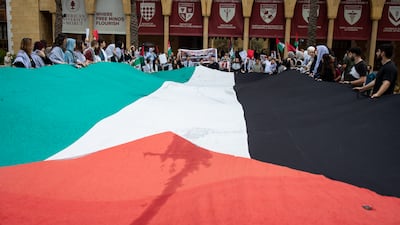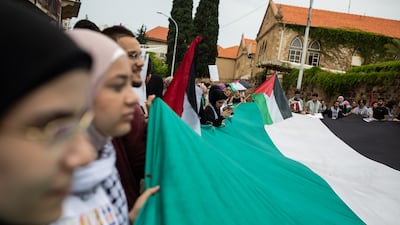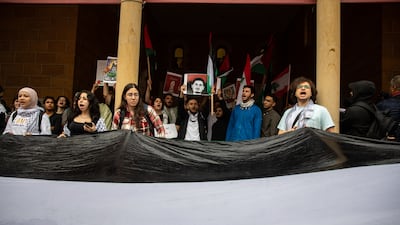Live updates: Follow the latest on Israel-Gaza
Hundreds of students in numerous Lebanese universities rallied in support of Gaza on Tuesday, joining a global movement that is pushing for academic institutions to divest from companies that provide support to Israel.
Co-ordinated protests were held throughout the country, including at the American University of Beirut, Lebanese American University, the Lebanese International University's Beirut and Bekaa branches, the University Saint Joseph in Beirut and the Holy Spirit University of Kaslik in Jounieh.
At some establishments, such as the American University of Beirut, students were demanding the school administration end all economic ties “with companies and institutions complicit in the Israeli occupation of Palestinians”, a statement from the protest organisers at AUB said.
“One of our main demands is transparency about AUB’s financial investments because we don’t know where our tuition money is going,” a third-year psychology student told The National. She declined to give her name out of fear of repercussions from the university.
Lebanon imposed a total boycott of all Israeli companies and products in 1955 but this does not encompass foreign companies that may provide military services to Israel or that operate in Israeli settlements in the occupied West Bank.
“All we can do now is boycott certain brands,” the student said. “But if we have financial transparency from the university, then we can know where we should demand divestment from.”
Students at AUB were demanding a boycott and divestment from Hewlett Packard, which provides services and technology to the Israeli army, “because the university relies on HP laptops and computers and we don’t want to use technology that funds a genocide”, the student said.
Campus encampments and solidarity rallies in the US and other western countries have been met with harsh repression, as the student movement proliferates, with hundreds worldwide arrested or suspended for their pro-Palestine activism.
Universities are on edge – even in Lebanon. Although the small Mediterranean country has technically been at war with Israel since 1948, it is also fragmented along political and sectarian lines. In Lebanon, Palestinian activism has been a touchy subject since the country’s 1975-1990 civil war, which some say was exacerbated by the presence of Palestinian political activity.

About 20 Lebanese army soldiers were sent to AUB’s main entrance where the university’s protest was taking place. They watched as students chanted ‘We want to know where our money is going” but took no further action to quell the rally.
Ali Tayyar, a third-year mechanical engineering student at AUB, said: “Whenever we see what's happening throughout the world with the students – in Columbia, Harvard, MIT, in Boston University, in all these universities – we see students are doing so much. And they’re not even close to Palestine like we are. So we wanted to support them. We felt ashamed [in comparison].”
“This protest was started by a group of non-Palestinians who wanted and were galvanised to do something on campus after they saw what was happening around the world,” said Mr Tayyar, who is also vice president of the Palestinian Cultural Club.
Staging divestment rallies on Lebanese campuses carries less urgency than in the rest of the world because Lebanon's national boycott law already prevents direct economic co-operation with Israel, Mr Tayyar explained. Still, he said, appealing for financial transparency from the university is a fair demand given the murky nature of the globalised economy, where thousands of interlinked companies and conglomerates could have ties to Israel.
“If there any ties or investments with Israel-related companies or companies that support Israel, we want to know,” he said. “And if there are, we need to divest.”

It remains too early to tell whether Lebanese universities like AUB will concede to student demands. The National contacted AUB for comment but did not receive a response.
The anonymous student who spoke to The National said students were already organising with the aim of further pressuring AUB into financial transparency and divestment. In the meantime, she said, they're communicating with organisers on US campuses “on how to maintain the momentum”.
For Palestinian students like Yumna Hamidi, a Media Studies student from Tulkarm in the West Bank who is in Lebanon on scholarship, the rallies are a message in and of themselves.
“I hope the university student movements will continue and that they will expand to other Arab countries and areas of the western world,” she said. “Because it might lead to a ceasefire and an end to the genocide in Gaza.
“It makes us feel as if we're not alone,” she said.










